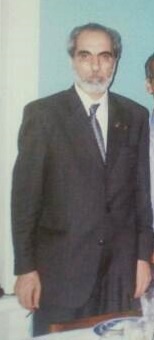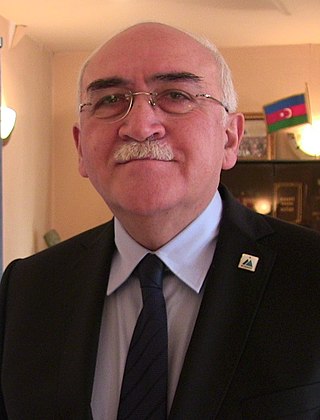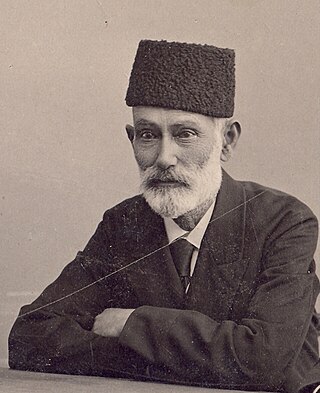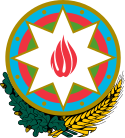
Heydar Alirza oghlu Aliyev was an Azerbaijani politician who was a Soviet party boss in the Azerbaijan Soviet Socialist Republic from 1969 to 1982, and the third president of Azerbaijan from October 1993 to October 2003.

The Azerbaijani Popular Front Party is a political party in Azerbaijan, founded in 1989 by Abulfaz Elchibey. Since Elchibey was ousted from power in the 1993 military coup, the party has been one of the main opposition parties to the Heydar Aliyev and Ilham Aliyev authoritarian regimes.

Presidential elections were held in Azerbaijan on 15 October 2003. As expected, Ilham Aliyev, son of the outgoing president, Heydar Aliyev, was officially elected with an overwhelming majority in a vote international observers deemed not to be free or fair.

Abulfaz Gadirgulu oghlu Aliyev, better known as Abulfaz Elchibey, was an Azerbaijani politician, Azerbaijani nationalist and Soviet dissident who was the first and only democratically elected President in post-Soviet Azerbaijan. He was the leader of the Azerbaijani Popular Front and played an important role in achieving Azerbaijan's independence from the Soviet Union.

Ayaz Niyazi oghlu Mutallibov was an Azerbaijani politician who served as the first president of Azerbaijan. He was the last leader of Soviet Azerbaijan, and first President of Azerbaijan from 18 May 1990 until 6 March 1992 and from 14 May until 18 May 1992.

The National Assembly, also transliterated as Milli Mejlis, is the legislative branch of government in Azerbaijan. The unicameral National Assembly has 125 deputies: previously 100 members were elected for five-year terms in single-seat constituencies and 25 were members elected by proportional representation; as of the latest election, however, all 125 deputies are returned from single-member constituencies.

The history of Azerbaijan is understood as the history of the region now forming the Republic of Azerbaijan. Topographically, the land is contained by the southern slopes of the Caucasus Mountains in the north, the Caspian Sea in the east, and the Armenian Highlands in the west. In the south, its natural boundaries are less distinct, and here the country merges with the Iranian Plateau.

Isa Yunis oghlu Gambar, also known as Isa Gambar, is an Azerbaijani politician and leader of the Equality Party (Müsavat), one of the opposition blocs in Azerbaijan. He was elected a member of parliament in 1990 and was elected parliamentary speaker in 1992.
Isgandar Majid oglu Hamidov was an Azerbaijani politician, Minister of Internal Affairs of Azerbaijan who served in the Popular Front government of 1992–1993. He was a nationalist and anti-communist. He played a key role in preventing Ayaz Mutallibov's 1992 self-coup.

Parliamentary elections were held in Azerbaijan on 12 November 1995, with a second round on 26 November. However, the results in 15 constituencies were declared invalid due to fraud, with fresh elections held on 4 February 1996.

Hasan bey Zardabi, born Hasan bey Salim bey oghlu Malikov, was an Azerbaijani journalist and intellectual, founder of the first Azerbaijani language newspaper Akinchi in 1875.

Presidential elections were held in Azerbaijan on 7 June 1992. The elections were the first in Azerbaijan in more than seventy years not held under communist control and featured the unprecedented use of television, posters, and other media by multiple candidates to communicate platforms and solicit votes.

The 162nd Turkistan Division was a military division that was formed by the German Army during the Second World War. It drew its men from prisoners of war who came from the Caucasus and from Turkic lands further east.

The State Oil Fund of the Republic of Azerbaijan, also known by its abbreviation SOFAZ, is a sovereign wealth fund of Azerbaijan founded in December 1999.

Presidential elections were held in Azerbaijan on 11 October 1998. The result was a victory for Heydar Aliyev of the New Azerbaijan Party, who received 78% of the vote. Voter turnout was reported to be 79%.

The Law on Abolishment of Nagorno-Karabakh Autonomous Oblast was a motion passed by the Supreme Soviet of the Azerbaijan Republic and signed into law by the President of Azerbaijan Ayaz Mutalibov on November 26, 1991. The law had been prompted by a vote in the National Assembly of the Nagorno-Karabakh Autonomous Oblast in favor of uniting itself with the Armenian SSR on 20 February 1988. The vote was followed by an independence referendum in 1991 which was boycotted by the Azerbaijani population of the Oblast; most voted in favor of independence. While these votes and elections had mainly been conducted in a relatively peaceful manner, in the following months, as the Soviet Union disintegrated, it gradually grew into an increasingly violent conflict between ethnic Armenians and ethnic Azerbaijanis. Both sides claimed that ethnic cleansing was being carried out. The declaration of secession from Azerbaijan was the final result of a territorial conflict regarding the land.

Tea in Azerbaijan is served freshly brewed, hot and strong. It typically has a bright colour and is served in crystal or any other glasses or cups. Azerbaijanis often use traditional armudu (pear-shaped) glass. Tea is served continuously when there are guests or when there is an interesting conversation. For Azerbaijanis tea with milk is uncommon. According to a common belief, drinking tea with lump sugar instead of sand sugar comes from the medieval period, when rulers who were afraid of being poisoned checked their tea by dunking a piece of sugar in a beverage. Traditional tea is served with lemon, cube sugar, sweets and fruit desserts. Sometimes thyme, mint or rose water is added, which is believed to be good for the stomach and heart.
Ivan Mirzoev was an Armenian businessman, the first person to drill oil in Baku and is considered one of the "founding fathers" of the Baku oil industry. He founded the Mirzoev Brothers oil company, which at the time had become one of the most effective and sustainable companies in the world oil industry. He was of Armenian descent.

The 1993 Azeri coup d'état, also known as the Ganja Uprising, was a military coup led by Azerbaijani military commander Surat Huseynov. On June 4, 1993, Huseynov's forces lead a march from the city of Ganja to the Azerbaijani capital of Baku in order to overthrow President Abulfaz Elchibey who was elected in independent Azerbaijan's first free election in 1992.
Audrey L. Altstadt is an American historian, specializing in history of Azerbaijan and Sovietology. She holds the rank of a Professor of History at the University of Massachusetts Amherst and authored three books and multiple articles on the politics, culture and history of Azerbaijan.














